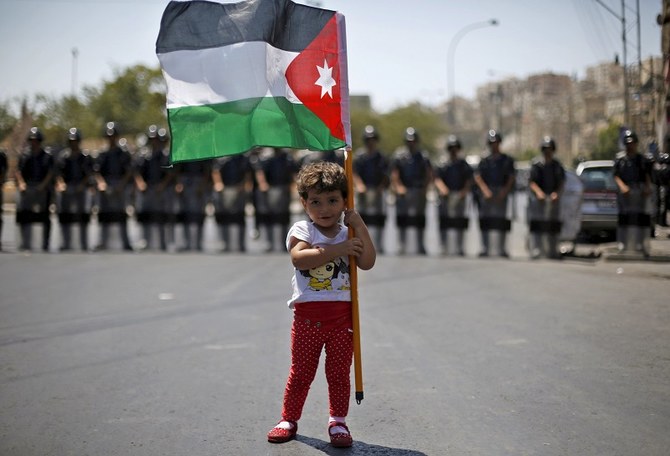AMMAN: The status of press freedom in Jordan is still classified as “restricted,” with a local media watchdog lamenting the “violations against journalists, people’s access to information and obstacles to news coverage.”
The Amman-based Center for Defending Freedom of Journalists has released the 2021 annual Media Freedom Index in Jordan report, which classified the kingdom as “restricted” for the second time in a row.
Jordan scored 215.2 out of 600 in the CDFJ 2021 Media Freedom Status Index, which is composed of 60 questions filed by 150 Jordanian journalists representing different media organizations in the kingdom.
The report, titled “Shackled,” attributed the classification to the absence of a political environment conducive to freedom of the press in Jordan.
The report claimed that there has been an increase in violations against journalists during 2021, “although many were left undocumented.”
The 2021 index included a number of sections, including the political environment, the legislative environment, the right to information, media freedom and freedom of expression.
CDFJ founder and director Nidal Mansour said that the 2021 findings suggested an increase in self-censorship, protection of the government’s interest by media executives and withholding of information by the government.
Mansour said that 2021 “has been shrouded in uncertainty, as the CDFJ did not officially document any violations against journalists,” adding that all findings were based on the experiences of journalists.
The political environment section, which examines the extent of the government’s support and intervention in the media, was rated “restricted” in the report, with a score of 19.9 out of 60.
The legislative environment section, which inspects the Jordanian constitution’s protection of freedom of expression, maintained its “partially restricted” rating in 2020 and 2021, while the right to access information section received a “restricted” rating for the second year in a row.
Freedom of expression is rated as “restricted,” with a score of 37.2 points out of 100.
The CDFJ’s findings were almost identical to those of the 2021 World Press Freedom Index compiled by Reporters Without Borders and Freedom House.
In Reporters Without Borders’ 2021 report, Jordan ranked 129th out of 180 nations in press freedom, ranking seventh among Arab states. In Jordan, journalists practice self-censorship, and one of the challenges they face is the issuance of “gag orders” by authorities, prohibiting them from covering certain issues, according to Reporters Without Borders.
Jordan was rated “Not Free” in the 2021 Freedom in the World report, Freedom House’s annual study of political rights and civil liberties worldwide.
In previous remarks to Arab News, journalists, rights activists and legal activists have expressed alarm over the “deteriorating condition” of press freedom in Jordan and the restrictions imposed on newsgathering, mainly the repeated gag orders, arguing such publication bans have been “misused” by the government to crack down on freedoms.
Journalist Khaled Qudah, who is also a council member of the Jordan Press Association, argued that Jordan’s ranking in global public freedom indexes has been “dramatically declining” over the past few years.
Qudah explained that the government was “abusing” the gag orders and “exploiting them to impose its iron grip on the media.”
The same remarks were expressed by Basil Okour, publisher of the JO24 news website, who described the status of press freedom in Jordan as the “worst ever.”
Citing Article 11 of the Cybercrime Law and the National Center for Human Rights’ recent report, Okour said that authorities have tightened their hold on journalists and activists, using a set of “martial laws.”
Article 11 stipulates that “anyone who purposely posts or reposts statements or information on the internet that include tort and slander or the denigration of anyone faces no less than three months in jail and a fine of no less than JD100 ($141) and no more than JD1,000.”
In its recent report, the NCHR stated that the crackdown on freedom of expression in the kingdom is increasing at an alarming rate, citing the detention of individuals for expressing their views on social media.
Lawyer Mohammed Qteishat also said that press freedom in Jordan is deteriorating.
Qteishat, former president of the Jordan Media Commission and legal advisor to former Prime Minister Omar Razzaz, explained that there are a number of laws in Jordan, including the Cybercrime Law and Penal Code, that are “hostile to media.”
Such laws are like “legal ambushes,” containing loose terms that governments then use to crack down on press freedoms, he said, adding: “The Jordanian legislature is expanding on prosecution at the expense of press freedoms.”
For Mansour, press freedom and human rights in Jordan are “on the line.”
“You cannot achieve democracy without a free press,” he said, citing the promise made by the Jordanian government to bring about political reform while at the same time restricting press freedoms.
He too blamed the “marshal laws” for restricting freedoms and silencing journalists, saying that there is no genuine will to bring about the sought-after reforms.
Human Rights Watch has downgraded Jordan in its annual index, indicating that Jordanian authorities have increasingly targeted political and anti-corruption activists on charges that violate the right to free expression.
Michael Page, deputy Middle East director at HRW, has criticized the worsening state of human rights in Jordan.
“Jordanian authorities should manage public discontent over domestic economic woes and austerity policies by engaging and listening to citizens rather than arresting protest organizers and those calling for public accountability,” he said.


























